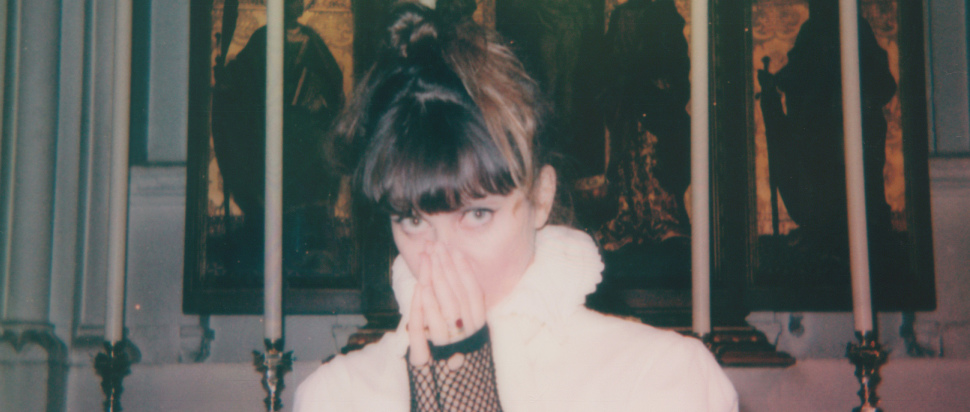Penelope Trappes brings Mother's Blood to Sonica
Ahead of her audiovisual performance of Mother's Blood at Glasgow's Sonica festival this month, we catch up with Penelope Trappes
Pedro Almodóvar’s Parallel Mothers, Céline Sciamma’s Petite Maman, Maggie Gyllenhaal’s The Lost Daughter, Michelle Zauner’s book Crying in H Mart – the subject of motherhood and the portrayal of mother-daughter relationships seem unusually prevalent. On Penelope Three, the third album in a trilogy from Australia-born, Brighton-based musician Penelope Trappes, released last year, explored a personal account of matriarchal lineage. Pairing dramatic vocals with gothic, often doom-laden pop, Trappes later deconstructed and reformed the record into Mother’s Blood, an audiovisual retelling that recalibrated the focus away from Trappes’ personal experience to something more universal. This month, she brings a performance of Mother’s Blood to Glasgow’s Tramway as part of the Sonica festival, a series of shows centering the 'visual sonic arts'. Trappes is pleased that her work may be part of an unspoken “cultural sine wave”.
“There’s definitely this strange global consciousness that we’re all sort of following and I'm more than happy to be one of the many that are embracing it,” says Trappes. "I think it's something potentially to do with the idea of nurturing, maybe because the world is getting so manic – the patriarchal sense of things is starting to crumble and it’s becoming obvious to some, and subliminal to others, that it’s not working out. And, because of that, we're all trying to embrace somehow, through our own personal stories, or through a movie or a song, where we come from or what our experience of nurturing has been. We all come from the womb, no matter how you identify in your adult life, and I think society has neglected that for too long. I think it's really cool that the creative world is holding the mirror up to it.”
If we all come from the womb, the sound produced by Trappes on Mother’s Blood attempts to recreate that. Gone are the lyrical plots of the songs’ counterparts on Penelope Three, replaced by expansive ambient soundscapes that are either wordless or filled with elongated howls. Often the music seems to be coming from behind a membrane, muted but bubbling up from beyond, still irrepressible.
“Penelope Three was more autobiographical and very specific to me,” says Trappes about the differences between these connected works, which she describes as “sisters”. “It had been this ongoing story which I have put a full stop on for now. It was that moment of me going, I'm just gonna come out and tell it like it is, my version, my vision, what it means to come from my matriarchal lineage, my mother, my daughter, that story and all its complexities, and try to convey those and hope that it would resonate. When that was all out on the table, I’d purged it, then I felt somewhat liberated and freer to explore the leftover resonance of that story, and that became less about having to be so verbose and obvious about it.”
Further separating Mother’s Blood from Penelope Three is its companion film, created with filmmaker Agnes Haus, with whom Trappes says she has a symbiotic and trusting collaborative relationship. The accompanying film was born out of a strong and consistent visual element running through all of Trappes' work to that point.
“We’d been doing these photography sessions exploring the concept of female identity as a mature woman, the concept of a nude and that shocking quality, showing the more real or slightly ugly, in that sense of non-conventional beauty,” she says. “I'm very inspired by specific female artists, from Cindy Sherman through to Louise Bourgeois and Francesca Woodman, these women that were basically challenging identity and female perceptions. So those have always sort of been going on in my work. And as we kept exploring this, eventually we’re sitting over a coffee and going ‘alright, let’s make a movie.’”
This will be the focal point of Trappes’ performance at Sonica, the film playing as she improvises with drone and samples. If Mother’s Blood is an evolution from Penelope Three, this live application of it will be a further evolution unto itself. “It’s exciting me because it will even surprise me. I’m getting into that meditative headspace and finding frequencies. I feel like I might have to turn my back to the audience.”
Trappes is committed to the ethos of Sonica in particular – the idea that music can be experienced in non-classical ways, in non-traditional spaces. “It ties into this idea of shifting social and cultural waves,” she says. “Now you don’t just have to go see a rock band in a normal concert venue. The thought that someone could walk into my show and have an experience that they’re not used to because they’re more into visual arts and then get to have this whole other aural experience is very cool and could be really touching for them.
“Changing environments for live music is so important, as they create safe spaces. But ultimately, I’ll play anywhere, whether it’s a gallery or a forest.”
Penelope Trappes: Mother's Blood, Tramway, Glasgow 10 Mar, 9pm, £14 (£7)
Part of Sonica, sonic-a.co.uk
